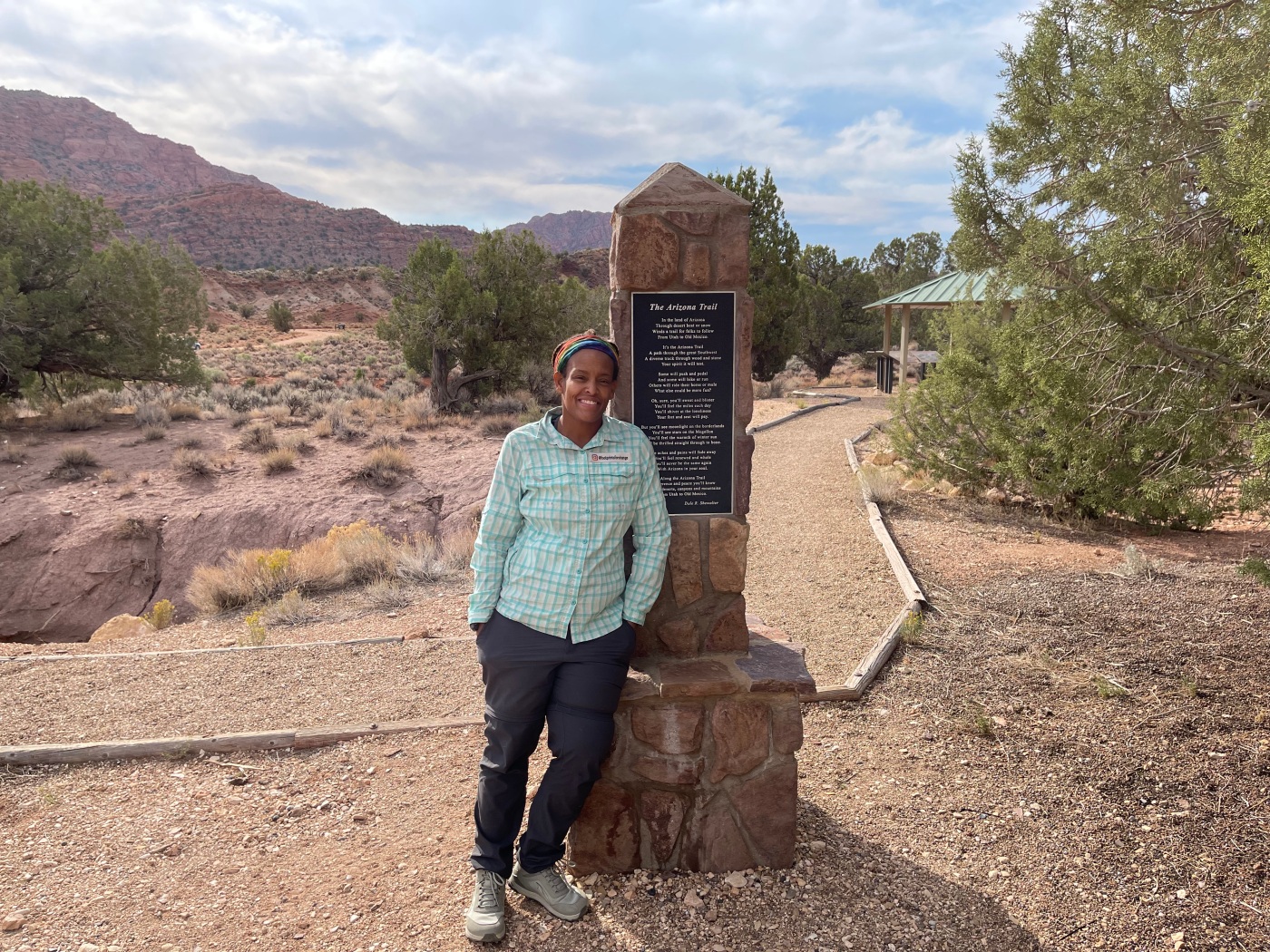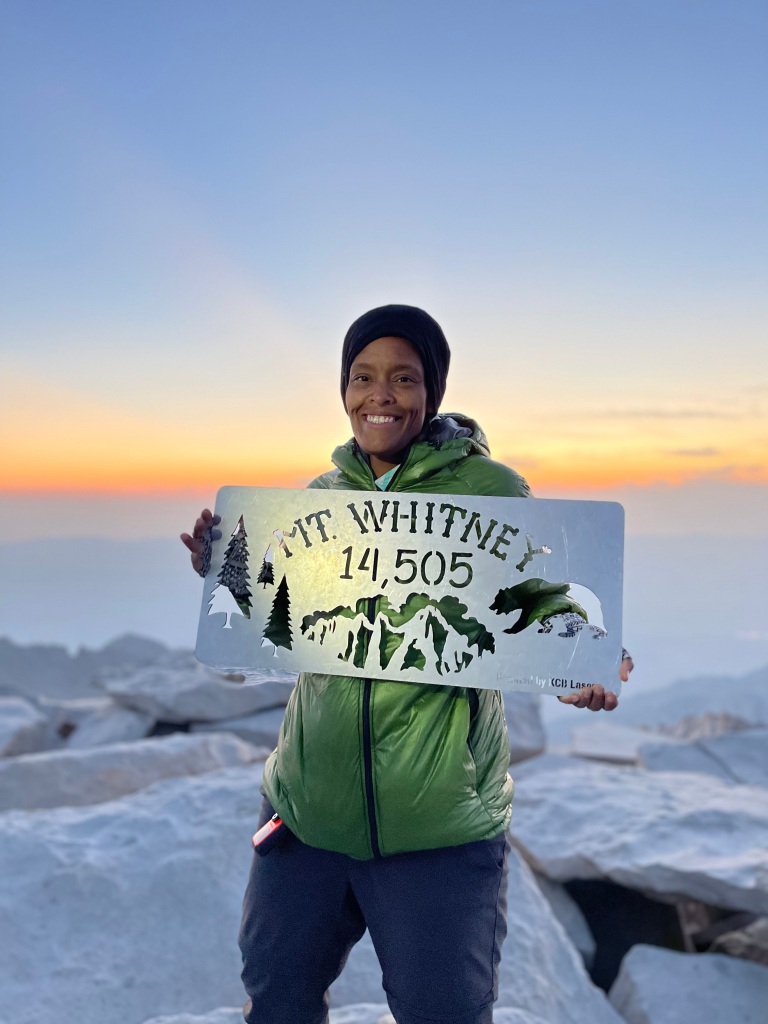Disabled Hikers: Building an Equitable Existence to Thrive

I can. I must. I will.
As an advocate for a better planet led by love and compassion, we can equip ourselves with a powerful tool of understanding through conversation. I hope sharing my experiences will educate those with little to no idea of the challenges of being a hiker living with a disability. In writing, I also hope to reduce the stigma surrounding individuals living with disabilities.
I am an environmental and social justice advocate, a writer, a hiker, and a person living with a disability. Utilizing my intersecting identities: Black, disabled, lesbian, and backpacker, I’m on a mission to get historically excluded folks outdoors in Nature.
One might classify me as a semi-professional backpacker, and my accomplishments are well documented. However, as an individual with invisible illnesses, some may not know the roads I’ve traveled to get here.
<script async src=”https://pagead2.googlesyndication.com/pagead/js/adsbygoogle.js?client=ca-pub-6139803315441080″
crossorigin=”anonymous”></script>
I am living with bipolar – a disorder associated with severe mood swings ranging from manic highs to depressive lows. I also live with Intracranial Hypertension (IH) – a rare brain disease causing my body to think and act like I have a brain tumor – yet, I don’t. For the latter, I have an implanted neurological device to control the negative side effects that stem from IH.

Over the past decade and a half, only my closest friends and family truly understand my struggles. IH made me sick all the time. Days were spent trying not to fall while struggling to stand. For years, I wished the room would stop spinning long enough to make a meal – and once complete, I hoped I kept the meal down. I suffered from debilitating migraines and lost complete vision in one eye. I endured multiple invasive surgeries, many of which were brain surgeries, to help alleviate and control the symptoms of IH.
I lived with the symptoms of IH for the greater part of my adulthood. During that period, I had no interest or desire to do anything. I was depressed, heavily medicated, and experienced significant physical changes. I slept all the time because everything I did hurt. I worried constantly and was filled with anxiety. My outlook was pessimistic and bleak.
I was tired of the pain and lost the desire to fight. I finally moved back with my parents during one of my darkest moments. I was blessed to have the support of my family. Especially my Dad, who every morning made me repeat the mantra: “I can. I must. I will.”
Then, he would drive me a little over a mile up the road to the gate entrance of our subdivision, leaving me to walk back home. I was barely able to walk a block without rest. I would have laughed if someone told me then that someday I would enjoy walking miles on end. But I found something to keep me coming back.
I’d use a little park at the halfway point between the gate and home as a resting place. I didn’t realize it then, but being outside in that park was healing. In little time, I began carrying a backpack on the walks. Inside were writing aids and usually a book to read. I started looking forward to those daily walks, especially the time I spent in the park.
I finally accepted that I would be in pain no matter what I did and recognized that I wanted to live a full life. Walking and being outdoors brought a sense of joy. I even craved spending time outdoors and walking. Which, in short, led me to run and, ultimately, my decision to become a backpacker.

Now, most days, I’m filled with unbelievable joy to be alive. That doesn’t mean I’m cured or that I’ll feel as fabulous tomorrow. I still have IH, and I’m still living with a mental health condition. Many things could change tomorrow, but Nature has taught me to embrace today. Hiking and spending time outdoors have positively impacted me. I think about how much better all our lives would be if we all took our cues from Nature to accept everyone and love unconditionally.
<script async src=”https://pagead2.googlesyndication.com/pagead/js/adsbygoogle.js?client=ca-pub-6139803315441080″
crossorigin=”anonymous”></script>
Spending time outdoors can be wonderful in many ways. The solace, the stillness, the trees, and the fresh air are a few things I enjoy about being outdoors. I think we all want positive experiences —and to get through adversity— in solidarity with like-minded folks. I find these connections outdoors.
I believe in creating inclusive, empowering outdoor experiences for all. I’m aware of the importance of visibility – growing up, I didn’t think the outdoors was for people like me. I was never exposed to Nature-based activities and never saw myself reflected in the outdoors. So, I set out on a campaign, Footprints for Change, to hike the Great Western Loop (GWL).
The GWL is a 6,875-mile-long footpath that links together the Pacific Crest Trail, Pacific Northwest Trail, Continental Divide Trail, Grand Enchantment Trail, and Arizona Trail — and a trail-less segment through the Sonoran and Mojave Deserts.
I began the three-part journey in 2021 on the PCT, hiking a little over 1,100 miles. I became the first person with a neuromodulator to climb Mt. Whitney, the largest mountain in the contiguous US. Unlike other hikers, I have to stop every ten days to recharge my neurological implant batteries. Because of this and other health and safety-related concerns, I creatively covered the 675-mile segmented trail as a car camping road trip.

This season I hiked 2,384 miles, including 400 miles on the AZT, completing a calendar year thru-hike of the 800-mile scenic trail. I have plans to rejoin the loop in 2023.
One reason I decided on such a huge undertaking is to advocate for more diversity in the outdoors, representing women, BIPOC (Black, Indigenous, People of Color), the LGBTQIA + community, and people living with disabilities.
I believe that Nature is a unifier; through her, we can build an equitable existence for all folks to thrive. When we can be our authentic selves, we feel more connected. I can work to make the outdoors a safe place for all creatures. I must actively engage others to join me. In solidarity with others, I will pave a path for folks with my various intersecting identities to have a reciprocal relationship with Nature and others. Through this relationship, we can work to heal humanity and save our dying planet. I will continue to do my part. I can. I must. I will.
Original version Disabled Hikers